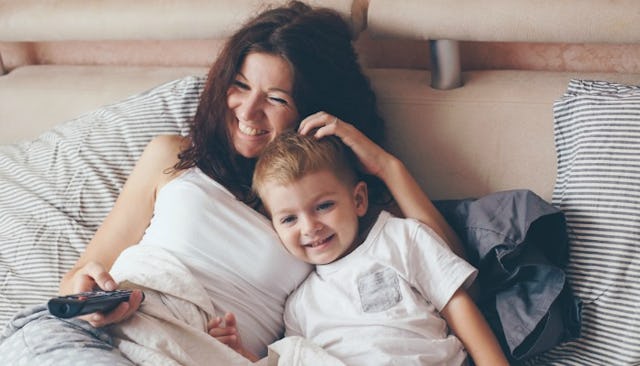Yes, It’s OK To Be Friends With Your Kid

Recently, a viral video was making the rounds on the interwebs called “I’m Not Your Friend, Kid.” It’s a funny, snarky video by the vlogger Kristina Kuzmic, with the premise that parents shouldn’t be friends with their kids because it diminishes their ability to parent with authority and power. And while I definitely LOL’d along with Kuzmic’s funny ice cream-eating, wine-drinking antics, I didn’t really jive with her overall message.
See, I think it’s possible to have it both ways: I think you can be friends with your kids and teach them boundaries and discipline.
I’m no parenting expert, but I do have a decade of parenting under my belt. And what stands out to me is this: Establishing a close-knit bond of openness and sharing with my kids is the foundation that allows me to teach them the life skills they need. Without that connection, I don’t see how it would be possible for me to get through to them, or for them to truly absorb and incorporate the things I’m trying to teach them.
Take, for example, the task of getting my 9-year-old to do anything around the house. And I mean anything. If I didn’t remind him, he would leave his socks on the kitchen floor for all eternity. If I didn’t tell him every morning to clear his cereal bowl, it would sit on the table with rotten milk for days. His Pokémon cards would lie in a volcanic mess on the floor of his room until he could no longer get to his bed.
It just hasn’t registered with him yet that you can’t freaking leave your crap all over the house — and that your parents aren’t always going to be the ones to clean it up for you. I decided recently that I needed to change that.
How did I do it? I’m not going to pretend I’m some perfect parent and that I was able to get him to oblige by simply staring him down with a fiery look in my eyes. Parenting is messy, in my experience, and there is no formula for success that will work for every parent. But in the case of trying to get my son to clean up after himself, the thing that worked best was talking to him.
Yes, I know that sounds insane. And I don’t know if it’s something that would work for every situation, at every age, and for every kid.
But I tried yelling. I tried withholding allowance and video games. I tried begging and pleading. Sometimes I use those things effectively (well, not the begging and pleading — I think we can all agree that’s just silly). But what worked in this case was talking to my son as I would talk to a friend.
It was all in how I did it though. I couldn’t do it right smack in the middle of the daily rush. Walking into his pigsty of a room and yammering on about how disgusting it is would have only infuriated him. Instead, I spoke to him about the incident at night, after lights out, when my son and I have our “special talks.” We have a longstanding ritual of chatting at night, and I make sure to reserve at least 15 minutes when it’s just the two of us, no distractions. These are the moments when we’ve always bonded. This is when we’re equals — just two humans who love and care about each other.
My son confides in me at night — his worries about school, friends, life. I confide in him too. Nothing too personal or outrageous, but I’ll tell him something I’m thinking about, maybe related to work or friendship. I keep clear boundaries with him and am sure not to burden him with my stress, but I also think it’s OK for him to know that I’m a human being.
So I decided to chat about housework during one of our nightly chats — not really as an authority figure, but more as a peer. I told him that it’s really hard for me to keep the house organized if he leaves a trail of stuff all over the place. I told him he is 9 now, and I can’t keep cleaning up after him, because part of my job is to raise him to be a good man — a man who takes responsibility for his stuff.
I saw the light bulb go off in his head — he got it. He told me he wanted to be a good person and to grow up to be one too. He wanted to cooperate.
And he has. I’m not saying it’s perfect. Of course it isn’t. But now, when three days’ worth of socks have piled up on the kitchen floor and I tell him to clean them up, I’m not met with blank stares. I’m not met with scowls. Sometimes he looks at me pitifully, and says, “Mom, I’m so tired. Please just clean it up.” And when I say, “Sorry, kid, I can’t,” he’ll eventually drag the damn socks off the floor.
I want my kids to listen and cooperate. I want to raise them to be upstanding citizens. But I don’t want them to follow what I say just because they’re afraid of what I’ll do to them if they don’t comply. I don’t want them to oblige just to please me. I want them to get it as best they can and to actually understand the messages I need to send them about what it means to be a good person.
And how do I do that? By establishing trust and open lines of communication with them — by being their friend.
This article was originally published on